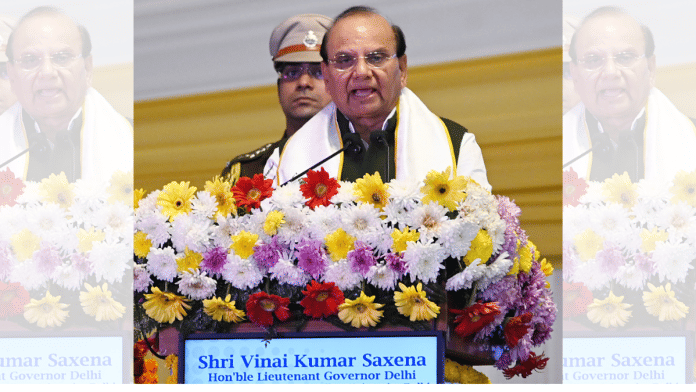New Delhi: The coordination committee of all district bar associations in Delhi has strongly opposed a notification issued by Lieutenant Governor V.K. Saxena which allows police personnel to depose before a court through video conferencing from their police stations.
In a statement released Wednesday, the coordination committee alleged that without consulting the bar, the judiciary or other key stakeholders, the notification fundamentally changes the procedure of trial and evidence presentation.
They claimed that while the 13 August notification cites the intention of expediting proceedings, the said measure is “neither practical nor lawful”. “And it strikes at the very root of fair trial principles, judicial independence, and public confidence in the justice system.”
The absence of a fair trial will lead to wrongful convictions and compromise fairness and the overall process, they said in the statement, demanding the notification be withdrawn within 48 hours or they would launch an agitation.
These remarks came in the form of a representation addressed to Union Home Minister Amit Shah, Delhi Chief Minister Rekha Gupta and Law Minister Arjun Ram Meghwal, following a meeting on Tuesday of the Coordination Committee of all District Bar Associations of Delhi at the Rouse Avenue district court in Delhi.
The committee has participation of lawyers from Delhi’s district courts, including Saket, Patiala, Tis Hazari and Karkardooma.
In the unanimous statement, the committee termed the notification anti-lawyer, anti-justice and against public interest.
According to the notification issued 13 August, all 226 police stations in Delhi were designated as venues from where police personnel could depose before courts through video-conferencing and present their evidence.
The legal basis for the LG’s notification was the second proviso or condition to section 265(3) of the Bharatiya Nagarik Suraksha Sanhita (BNSS), which broadly deals with evidence for prosecution, and allows for witnesses to be examined by “audio-video electronic means” at a designated place notified by the state government.
The notification also relies on section 308 of the BNSS, which says that, unless otherwise provided, “all evidence taken in the course of the trial or other proceeding shall be taken in the presence of the accused”. In situations when the accused’s personal attendance is dispensed with, it can be taken in the presence of an advocate through audio-video electronic means at a “designated place to be notified by the State Government”.
‘48-hour ultimatum’
Speaking to ThePrint, coordination committee chairman advocate V.K. Singh said, “We have given the government an ultimatum to withdraw the notification within 48 hours, because this is the second time they have passed such an order.”
Earlier on 15 July, a similar notification was released by the L-G, Singh said.
“If they don’t withdraw by tomorrow, we will strike and protest,” he said, terming the notification “arbitrary” and unjust. “If evidence is taken at the police stations, as opposed to the court, our practice, as criminal lawyers, will suffer. We are strongly against it.”
Echoing Singh, coordination committee secretary general advocate Anil Kumar Basoya, said this move could negatively impact witness testimonies, recovery of weapons, and recording of evidence.
“As a matter of fact, evidence is always recorded in the court. It entails recovery of weapons, clothes, and other articles in criminal cases. These actions are only possible when all parties are physically present. For instance, when sealed articles are presented in court, they are opened only in the presence of the judge,” he said.
Basoya also said the L-G’s notification will lead to the denial of justice. “Evidence is the most important thing in a trial. If a witness is sitting somewhere and he is being influenced or tutored, who will take care of that? There is no one to keep a check.”
In their 20 August representation, the committee also states that from a procedural standpoint, when an officer deposes from within his own police station, there can be no assurance that he or she isn’t aided by undisclosed notes, documents or external inputs. “Such a setting inherently lacks neutrality and renders the deposition susceptible to manipulation.”
The committee also said the presentation of physical evidence such as weapons or seized articles cannot be carried out effectively remotely, thereby compromising the evidentiary process and fitness of trial.
Advocate Sharad Jain told ThePrint the notification disrupts the status quo, where evidence is recorded in courts.
The only medium for dispensing justice is the court, Jain said, adding that evidence is almost always presented in the presence of a judge and advocates, besides the police. “In the police stations, however, you can easily manipulate someone,” he said.
In their representation sent to Home Minister Shah, Law Minister Meghwal and Delhi Chief Minister Gupta among others, the lawyers also said procedural reforms that affect the litigant’s rights cannot be brought about by an administrative fiat.
“This notification is not only against the general public but also against the legal fraternity and the law itself. Lawyers are not fighting for their personal convenience, they are fighting in the larger public interest to protect litigants whose lives and liberties depend upon free and fair trials,” the lawyers said in their statement.
(Edited by Ajeet Tiwari)
Also Read: Unclean & ill-equipped—the ‘sorry state’ of women’s washrooms in Delhi’s district courts






